Thirty years ago, this month, Ravi Shastri decided to take the plunge into television commentary to forge an enduring career behind the microphone. He talks on what it took to become a much sought-after commentator
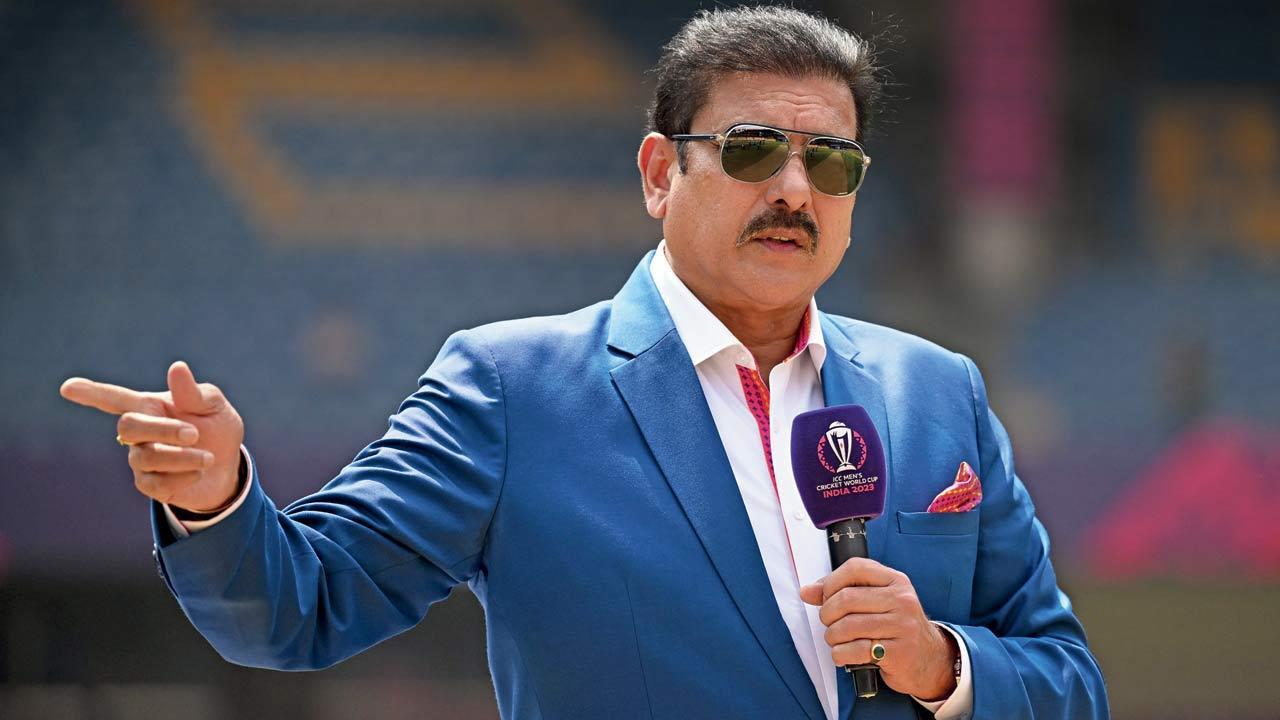
Ravi Shastri
That's exactly what the doctor ordered,” is what we often hear Ravi Shastri say during commentary. It’s 30 years since he did just what his inner doctor ordered and joined his fellow cricketing stalwarts in the commentary box. Shastri looks back at his 1994 baptism in profound fashion. When his late father called to find out how his son was faring in his post-playing career, Shastri Jr told him that he felt he belonged to commentary even though he was two games into broadcasting. On his return to India, “the done and dusted with cricket” Shastri quit his job at Tata Steel and sailed away on the commentary cruise liner as it were. Save the years when he headed the Indian cricket team’s coaching staff which resulted in back-to-back Test series wins in Australia as well as missed opportunities to grab the silverware, Shastri, 62, has rarely been away from the microphone.
ADVERTISEMENT
Excerpts from an exclusive interview:
Did you realise that you have spent the last 30 years touring the world either as a commentator or a key member of the Indian team support staff?
I have not realised how 40 years of being associated with this sport have gone by. I haven’t taken a break in all these years—as a player, broadcaster and coach. To realise that I started broadcasting 30 years ago is unreal. When people ask me, could you have done something else, I say, how could I think of doing something else when I could do something I’ve loved all my life.
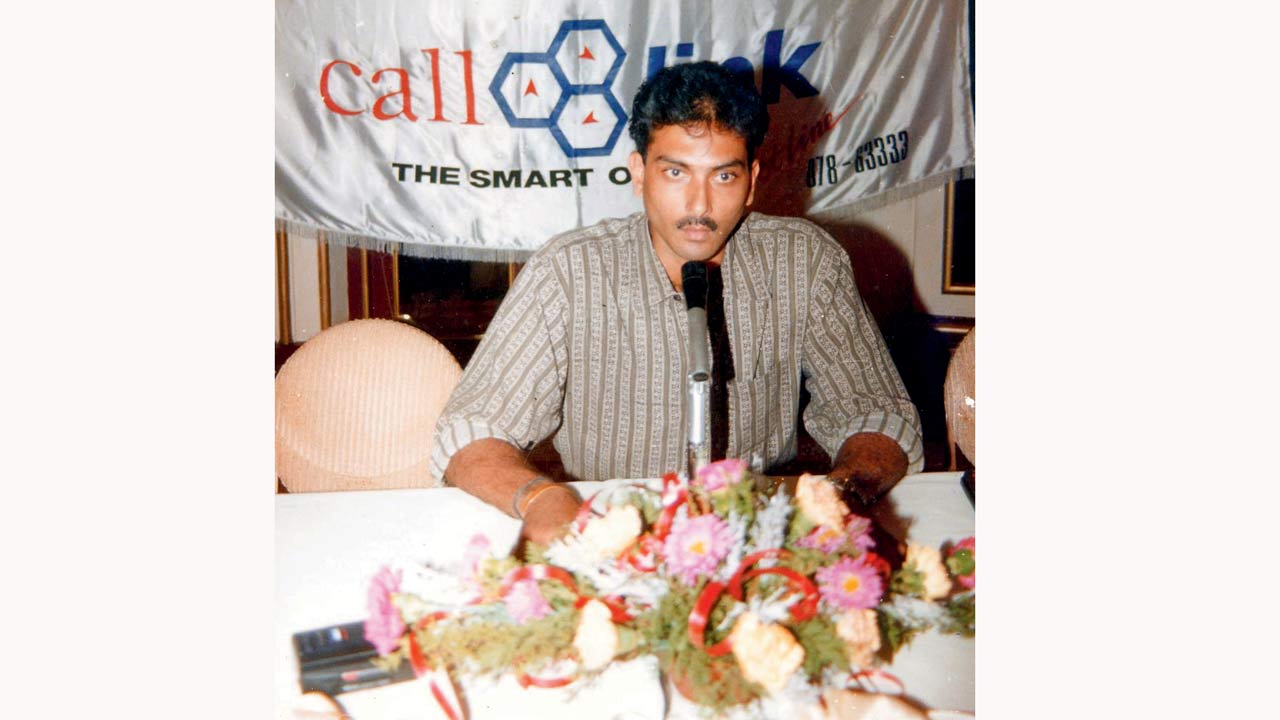 Ravi Shastri announcing his retirement from cricket at Colombo in September 1994. Pics/mid-day archives, Getty Images
Ravi Shastri announcing his retirement from cricket at Colombo in September 1994. Pics/mid-day archives, Getty Images
How did the offer come about for that 1994 Singer World Series tournament in Sri Lanka?
I got a call from the then producer Gary Francis, who asked me if I would be interested in doing commentary for the quadrangular series in Sri Lanka. I had just finished playing the Ranji Trophy. Mumbai had won it [1993-94] and I knew how much I had struggled through that tournament. I might have got the highest number of runs [for Mumbai] in the Ranji Trophy season, but I knew what my knees were going through. I also knew at the back of my mind that playing international cricket at the level I had played might not be easy and I was not prepared to play just first-class cricket. So, I said let me give this a try and see how it goes.
How did your father react?
He got a shock. He said are you sure [when told that he felt he belonged to commentary). I said yes, I’m done and dusted… very clear. Then I went and told my employers Tata Steel that I am done and dusted there too, and that I don’t want to occupy a desk which should belong to somebody else and just be on your payroll. I said I am going to be traveling around the globe doing this. Even they got a shock. They [Tata Steel] were my guardians for so many years. I had to go and speak to Ishaat Hussain.and JJ Irani and they were very kind and said anytime you want to come back, or do something here, you are most welcome.
Were you nervous to be in front of the camera?
Yes, I had butterflies in my stomach, which happens before every big game. There is always that anxiety. The tosses, which are live, get the butterflies
going. You f*** up there, the world sees you have f****d up. A lot of other stuff is recorded, but something like the toss is live. Every channel around the world, every pre-game show will stop as you go to the toss whether it is in India, England, Australia or South Africa or wherever. It will come to a standstill when they go to toss. You make a mistake, well, you got to live with it—put your hand up and admit, you screwed up.
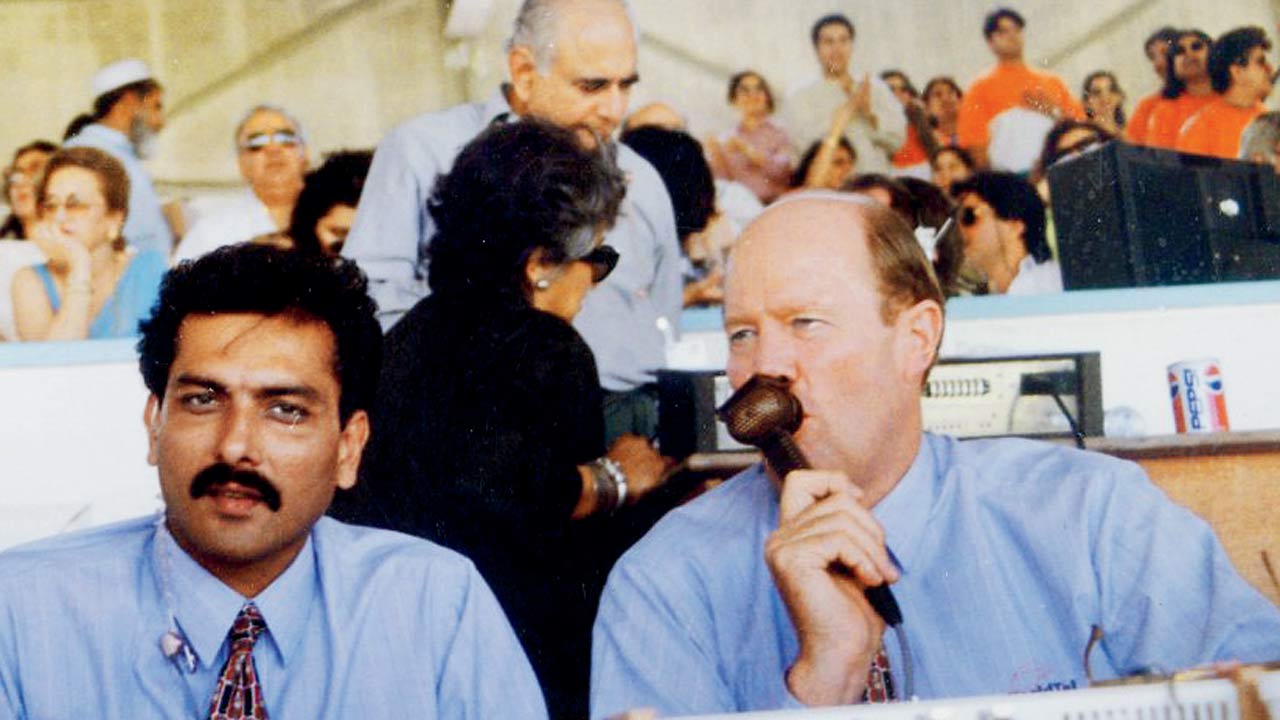
With Tony Greig in a Sharjah tournament
How much of a role did Mark Mascarenhas play in your assignments?
Massive role, because he was the main guy who was doing the production. It was his telecast, done by WorldTel. I worked with the best in the first three to four years—Tony Greig, Richie Benaud, Ian Chappell, Michael Holding, Geoffrey Boycott, Tony Lewis, David Gower—the best in the business. Then, in the 1996 World Cup, with a whole lot of commentators. It was different, it was hard but there were times when I was doing 140-145 days of live cricket [in a year] around the globe. From 1994 to 2004, I must have done at least 130-140 days of live cricket which means every two-and-a-half days, you were on a flight across Africa, Sri Lanka, India, Australia, New Zealand—you name it. Sometimes in Singapore, because all the companies were based there then, and of course, in the UK doing that 1996 India v England for Test Match Special (TMS) radio as well as BBC television. I did a lot of neutral series as well— Australia in South Africa, where I saw Adam Gilchrist’s fastest double hundred [off 212 balls at Johannesburg in 2002].
Along with your commentary you also started writing on matches regularly. I remember you faxing your handwriting your column or talking to a journalist of that particular publication…
I loved it, but when you started broadcasting it becomes a little tedious. I still love writing. If I have to do it on my own I will do a pretty good job. Now, the whole game has changed. You realise you are saying enough [in commentary]. And with social media and other things coming in you know, it becomes increasingly difficult. You can make your point in a lot of other mediums.
Was it special to call that India v Pakistan 1996 World Cup game in Bangalore?
It was! When you are doing live television, you don’t know what to expect and you get a lot of special games. You cannot over prepare because things are happening and unfolding in front of you which makes the job very exciting for me and not mundane. I kept it very simple. I had no agenda. I just spoke on what I saw. India v Pakistan is traditionally massive. To be involved in a game of that magnitude was big, no question about it.
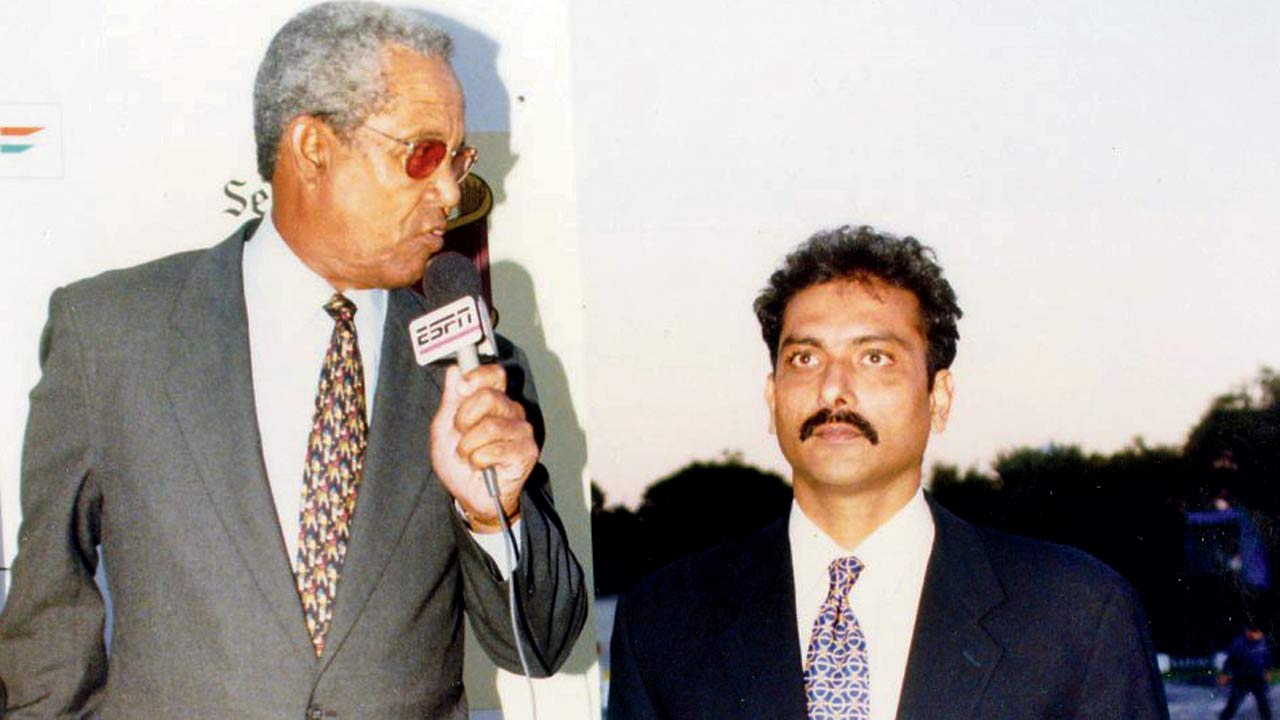 With Sir Garfield Sobers at a tournament in the 1990s
With Sir Garfield Sobers at a tournament in the 1990s
Two overseas legends in the box — ex-captain Imran Khan and legendary commentator Richie Benaud. Was that a proud moment for you?
You are talking of Imran, Richie, Tony Greig, Chappell, Holding, Henry Blofeld and Tony Cozier, who did that series, These are some serous blokes, the biggest names in television and a lot of them captained their countries.
How much do you look up to Ian Chappell, the commentator?
Fabulous. Two of the most forthright, hold-no-bars commentators were Chappell and and Holding; had very strong views. You could see why Chappell in every word he spoke. He was a tactician, who knew the game inside out and someone who handled some of the biggest personalities who were different in nature. You could see that coming through in commentary. A lot of your cricket would come through your commentary.
Tony Cozier was someone whose commentary you followed as a kid…
He was a master. The voice, the accent, I could pick him up on radio. I just had to listen to two lines and I knew I was on the right station, just hearing the voice. There used to Voice of America, Test Match Special (TMS) Radio Ceylon at that time and you had to just slowly rotate that needle. It would stop and if you hear ‘driven for four’ you knew it was Cozier. There was Brian Johnston, John Arlott and you knew you had caught TMS but Cozier would come out the clearest.
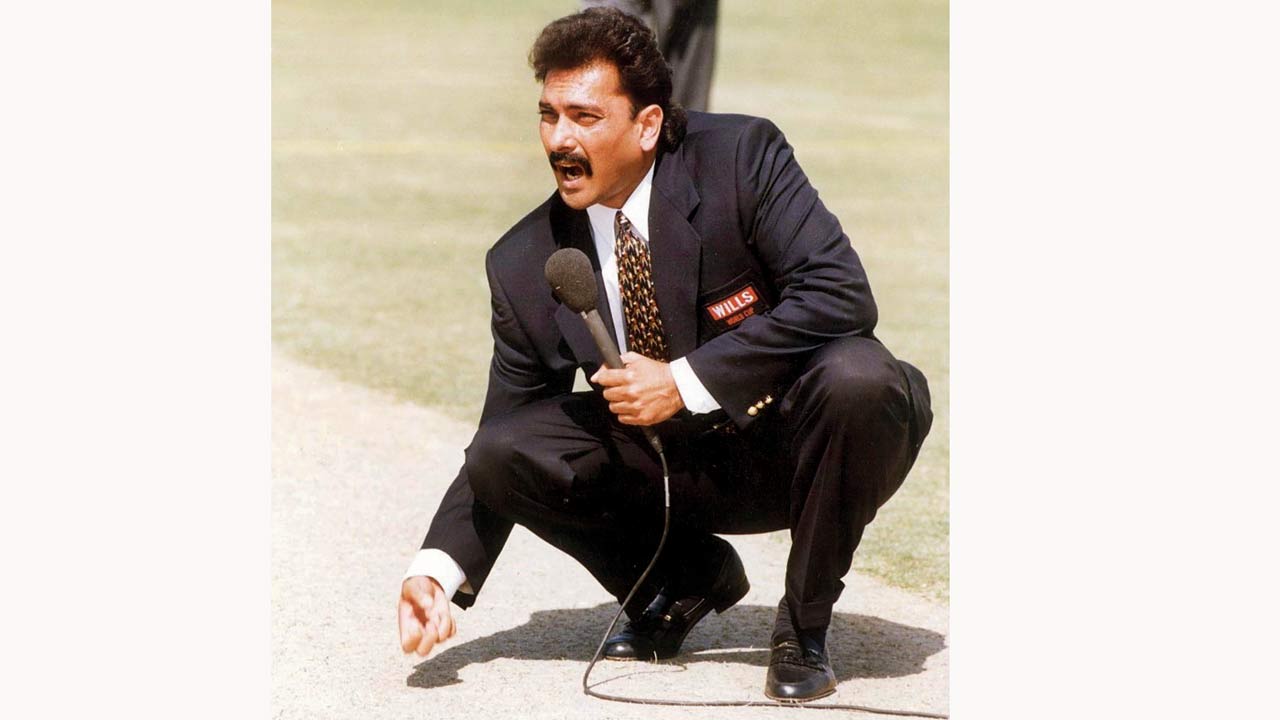
Doing a pitch report
And the other Tony?
Greigy was a legend… absolutely. He knew how to sell the game. He knew the pulse of the people, what they wanted. Let’s say he was a marketing genius. He made cricket lively. There was energy and there was Tony Greig.
Do you believe that 1998 Coca-Cola Cup in Sharjah had the best commentary team? You had Sir Garfield Sobers, Richie Benaud Sunil Gavaskar, the Chappell brothers and yourself…
These are very big games and the cricket backed it. The way Sachin [Tendulkar] batted, it was unreal. He got a thousand runs against Australia in those two and a half months and those back-to-back hundreds against Australia. It was exhilarating stuff, real fun. Mark, who was doing that telecast assembled some of the biggest names you will get in cricket and we had a lot of fun even after the games. I remember after one of the games, it two or three o clock in the morning and the game had got over at 11-11.30 pm. By the time we reached Dubai it was past midnight. We were having a drink in Mark’s room and there was Ian, Sobers and me and while Sobers was having his drink and talking cricket, his feet were moving as though he was anticipating a ball pitched up or down. This was probably the greatest player to play this game [moving his feet]. It was something I will never forget.
Would you say Martin Crowe was unique because he had style, delivery, an inquisitive mind and good knowledge of TV production being a producer himself?
Martin was very knowledgeable about the sport like Barry Richards and ,Greg Chappell. They were ahead when it came to a lot of talk on batting. Greg came with an all-round perspective. Michael Holding came with a total fast bowler and an all-round perspective, Boycott was an outstanding reader of the game with a sense of humour. Richie had all the qualities what broadcasting needed — how much to speak, how less to speak, the content of speech, all those things were very important for him. You picked from each one of these guys. They all had tremendous strength and I was like a sponge. I absorbed everything I got.
And how can we forget Shane Warne, the commentator…
He was brilliant. I really miss him. I missed out on three tours of Australia when I was the coach — 2015, 2019 and 2021 and Warnie was doing commentary. It would have been really fun working with him and the little commentary I did with him, was terrific.
What are the origins of your ‘tracer bullet’ description?
(Laughs). It came because of the [2003] Iraq war and I said something on air like ‘it’s taken off like a scud missile into the crowd for a six’. Then, I said it went into the fence like a bullet, a tracer bullet, which is a special kind of ammunition, but it is straight — [hits] wherever needed.
We saw a straight-talking Ravi Shastri in that controversial moment on air with Nasser Hussain in 2011. How do you look back on it?
It happens. He is a fantastic broadcaster, one of the best in the business and at the end of the day, you are colleagues who do a lot of work together. Things happen and at that moment you can be expressive just like it happens on a cricket field.
From the commentary box in the 2001 India v SA Test at Port Elizabeth, you went for that press conference, where you asked match referee Mike Denness why he was there if he was offering no comment after banning six Indian cricketers. What enraged you?
Nothing enraged me, but what annoyed me was that he had come there and was not saying a word. I asked what are you doing here if you are not going to say anything. We know what you look like.
Then, during the player contracts issue you asked on air why was BCCI president Jagmohan Dalmiya not in England in 2002…
Again, things happened on the spur of the moment. I still rate him as one of the finest administrators. We had our run-ins at that time, but I have a lot of respect for him.
You called Dalmiya the Muhammad Ali of BCCI…
The coffers of the ICC were empty. Dalmiya singlehandedly took it [the financial condition] to another level. He was a genius and you had to give him that respect. He had his own way of functioning.
You got flak for calling Lalit Modi the Moses of the game…
Why flak?
Because people felt you said it since you were part of the system, part of the IPL and people found that odd…
I’ll still say it. He is a genius. I mean to conceptualise what he did, he has to be given credit. What flak? Wherever credit is due, give it to him. The sequence of events [in 2010] was unfortunate but you cannot take away the fact that the seeds were sown by him.
You are pretty chilled about trolls…
(Laughs). To be honest, I don’t read them. One day, it’s trolls and next day, you are in pole position. Kya farak padta hain?
Calling the final ball of three World Cup wins involving India must have given you immense satisfaction, pleasure… what do you call it?
It was a great honour first of all, especially 2011. It was unbelievable. That moment still lingers in my mind when MS Dhoni hit that six in Mumbai, your city, it is a ground where you have played a lot of cricket and to sit in the box and call the final ball was a dream. One of my most exhilarating moments of commentary was Yuvraj Singh’s six sixes in an over [against England in the 2007 World T20 at Durban]. On air with me was David ‘Bumble’ Lloyd. Now, he was an outstanding commentator with a great sense of humour, always rising to the occasion. Bumble stood out. New Zealand’s Ian Smith is a fine one too.
Smithy’s done it all—from rugby to cricket.
Have you regretted anything you said on air after returning to the hotel?
Regretted? No!
Like saying to yourself I could have put things better?
Yeah, at times you might think there were better word options but that’s how you improve, become better at your job. You always have to find ways and say, hey that sounded good, but how can it sound better? But you must not have any regrets because that goes with the flow. When you listen to it, once or twice you say maybe the choice of words [could have been different]—reserve it for later.
There is no retirement age in commentary so how long is the road ahead?
Till you enjoy it, till you enjoy the travelling. We commentators are very passionate about the game and I speak for every one of my age who has been around for that long. That is why they are prepared to do the yards. It’s not easy. Most importantly, you have to enjoy it. If you are doing it for the sake of doing it then I don’t think you should do it.
Also Read: ‘Ravi’s an enthusiastic commentator, who talks a lot of sense’
 Subscribe today by clicking the link and stay updated with the latest news!" Click here!
Subscribe today by clicking the link and stay updated with the latest news!" Click here!








